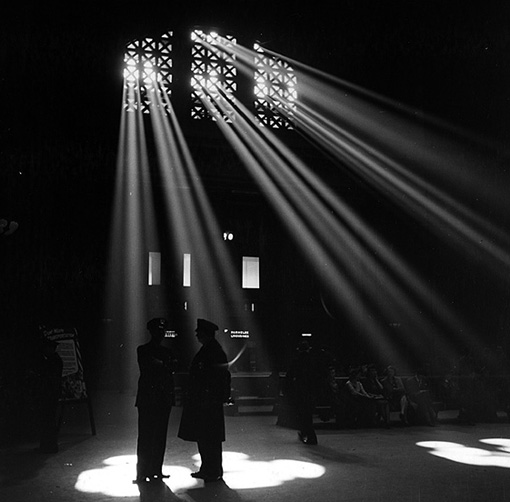
All of my poems appear like blown off fragments of the night which somehow show up the next morning like damaged children. All of my poems surface like the remnants of some kind of horrific shipwreck. Or, they float in the air like bits and pieces of an aircraft’s fuselage that refused to go down with the rest of the plane. They just float and wait like metaphors in a painting Magritte never finished. I am and have been surrounded by an ocean of wrecked metaphors, awash and flowing toward some kind of psychic catastrophe.
The long poem that I have been calling DILLINGER for more than twenty years is simply and precisely an ocean of half formed, peculiarly shaped, carefully composed, and at the same time almost irretrievably wrecked metaphors. I began with Dillinger the man and then progressed to Dillinger the legend and finally Dillinger the archetype. Dillinger is still the historical Dillinger but he has morphed so much more than that. Dillinger has always been a celebrity outlaw, but the implications are there for his becoming the universal, the ultimate american outlaw. And, because of this, the implications also point to DILLINGER as becoming the ultimate american outlaw poem as well.
Bukowski never wrote the ultimate american outlaw poem unless you consider his whole body of work as a kind of extended poem. Micheline never wrote the ultimate american outlaw poem unless you consider his entire body of work as the ultimate summing up american outlaw poem. Kell Robertson never wrote anything that comes close to the ultimate american outlaw poem unless you want to make the case that his entire body of work be considered as an extended american outlaw poem. Ditto Bremser, ditto levy, ditto Ginsberg, ditto Burroughs, ditto Kerouac. A good case could be made for thinking of all these poets and novelists as Outlaw Poets. But, even as good as they are and they are among the best all time Outlaw Poets who ever lived in this country, I don’t think any of them ever wrote the ultimate american outlaw poem.
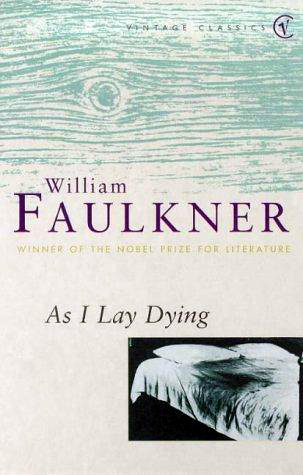 The question is has Cormac McCarthy written the ultimate american outlaw poem? And, yes, this is a strange question in light of the fact that McCarthy has worked almost entirely as a novelist and whatever poetry he has written has very little to do with the issue at hand. However, if, for a moment, we consider McCarthy to be a poet in the very broadest sense of that term, then has he written the ultimate american outlaw poem? The obvious answer is yes, BLOOD MERIDIAN; still, it must inevitably share the stage with DILLINGER. Hold your ears folks, there may be some yelling. I’d be monumentally surprised if there isn’t. But, for a moment, lets consider what Harold Bloom has written about McCarthy’s novel in his critical work NOVELISTS AND NOVELS. “The fulfilled renown of MOBY DICK and of AS I LAY DYING is augmented by BLOOD MERIDIAN…” So, in the widest possible sense, BLOOD MERIDIAN is an ultimate american outlaw poem, but in the accepted critical sense, it is actually a novel.
The question is has Cormac McCarthy written the ultimate american outlaw poem? And, yes, this is a strange question in light of the fact that McCarthy has worked almost entirely as a novelist and whatever poetry he has written has very little to do with the issue at hand. However, if, for a moment, we consider McCarthy to be a poet in the very broadest sense of that term, then has he written the ultimate american outlaw poem? The obvious answer is yes, BLOOD MERIDIAN; still, it must inevitably share the stage with DILLINGER. Hold your ears folks, there may be some yelling. I’d be monumentally surprised if there isn’t. But, for a moment, lets consider what Harold Bloom has written about McCarthy’s novel in his critical work NOVELISTS AND NOVELS. “The fulfilled renown of MOBY DICK and of AS I LAY DYING is augmented by BLOOD MERIDIAN…” So, in the widest possible sense, BLOOD MERIDIAN is an ultimate american outlaw poem, but in the accepted critical sense, it is actually a novel.
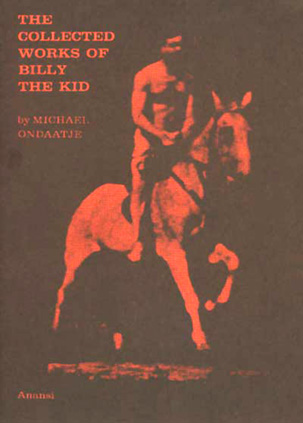 Back to the idea of the ultimate american outlaw poem. Except for DILLINGER, there aren’t any. None that I know of, amigo. HOWL is anarchically mad, but it really isn’t outlaw. LETTER TO AN IMAGINARY FRIEND is political, populist, and outside the margins but it really isn’t outlaw. The fact of the matter is there was nothing before and nothing after DILLINGER that could come anywhere close in comparison. And, when I say outlaw I mean OUTLAW with all the weight, the menace, and the explosiveness that the word implies. I am talking about any long poem which has as its central character a wanted man, a bankrobber, a felon who is also the representative dark american hero. Michael Ondaatje’s THE COLLECTED WORKS OF BILLY THE KID is clearly a hybrid. It has been called a novel and it has been called a poem. Either way, it is a miniature. It does not possess the heft or the authority or the depth or the vision of DILLINGER.
Back to the idea of the ultimate american outlaw poem. Except for DILLINGER, there aren’t any. None that I know of, amigo. HOWL is anarchically mad, but it really isn’t outlaw. LETTER TO AN IMAGINARY FRIEND is political, populist, and outside the margins but it really isn’t outlaw. The fact of the matter is there was nothing before and nothing after DILLINGER that could come anywhere close in comparison. And, when I say outlaw I mean OUTLAW with all the weight, the menace, and the explosiveness that the word implies. I am talking about any long poem which has as its central character a wanted man, a bankrobber, a felon who is also the representative dark american hero. Michael Ondaatje’s THE COLLECTED WORKS OF BILLY THE KID is clearly a hybrid. It has been called a novel and it has been called a poem. Either way, it is a miniature. It does not possess the heft or the authority or the depth or the vision of DILLINGER.
Now, lets ask the same question but leave out one word. Where is the ultimate american poem? I love and have always loved THE WASTE LAND but it’s a little poem, a vest pocket epic. And, yes, I will grant that it is a small poem, one with huge ambitions, enormous layers, and undeniable vision. But, it is not the ultimate american poem. Its opposite is THE CANTOS. Which is a huge poem, sprawling, thick with language and languages, opinionated, cantankerous, attempting to be all encompassing, but somewhere inside its myth and its intelligence THE CANTOS is not the ultimate american poem. Though it desperately wants to be. If any poem ever wanted to be the great american poem THE CANTOS is it.
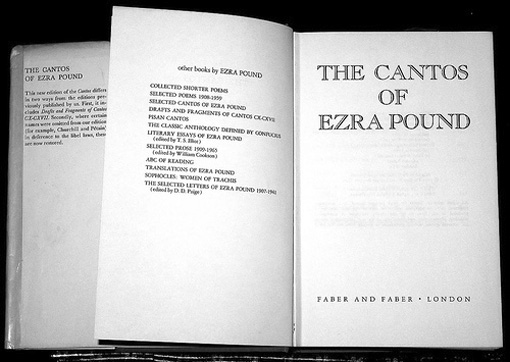
The problem with THE CANTOS is that the central figure is Pound and Pound ultimately damaged himself. THE CANTOS is great because of its unfinished quality and the deep probing sense of its darkly sublime damage. Maybe that is what really lies at the heart of the great american poem. That sense of irreparable brokenness.
 Before THE CANTOS, there is LEAVES OF GRASS. And, also Dickinson, but she doesn’t mean as much to me as Walt Whitman does. And, if I have to pick just one poem out of LEAVES OF GRASS it would have to be Song Of Myself. When I was writing The Name Is Dillinger I was thinking of Song Of Myself. I was also thinking a little bit about the bible and about an old time fire and brimstone preacher I’d known in the fifties. And, I was also thinking the old idea of oratory, maybe of the Lincoln Dougleas Debates which I only knew of through books, maybe of the way the old time medicine men might have sounded while they were hawking the best of all possible tonics. I had all those ideas going around in my head. Also Carl Sandburg’s voice, though I had never met him, had only heard his recorded readings. I wanted something that sounded old timey biblical, smartass wise guy, and primally dangerous.
Before THE CANTOS, there is LEAVES OF GRASS. And, also Dickinson, but she doesn’t mean as much to me as Walt Whitman does. And, if I have to pick just one poem out of LEAVES OF GRASS it would have to be Song Of Myself. When I was writing The Name Is Dillinger I was thinking of Song Of Myself. I was also thinking a little bit about the bible and about an old time fire and brimstone preacher I’d known in the fifties. And, I was also thinking the old idea of oratory, maybe of the Lincoln Dougleas Debates which I only knew of through books, maybe of the way the old time medicine men might have sounded while they were hawking the best of all possible tonics. I had all those ideas going around in my head. Also Carl Sandburg’s voice, though I had never met him, had only heard his recorded readings. I wanted something that sounded old timey biblical, smartass wise guy, and primally dangerous.

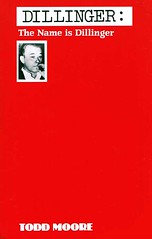 However, if you compare The Name Is Dillinger to Song Of Myself, what you will almost certainly discover is that these two poems are situated at opposite ends of a tangled national epic spectrum. Whitman may have been an outsider but he was never an outlaw. He may have stood at the edges of society in 1854 but he had no criminal intentions. In 1976, while I was writing The Name Is Dillinger I was still a street thief, at least in my head. Once you step across that line you are on that other side for always. And, what I was stealing while I was writing this poem was the language of a culture. Stealing all the smashed and broken pieces of it and reinventing my own dark vision of america. Whitman’s Song Of Myself was a gift to the culture of 1855. This kind of national epic is always a gift. Undeniably, The Name Is Dillinger is an anti national epic. It is a stick of dynamite, it is a hand grenade, it is a molotov cocktail. What it is, what it has to be is a smart bomb directed at the american culture of the late twentieth and early twenty first centuries. A long poem like The Name Is Dillinger is always a weapon the same way that Picasso’s GUERNICA is a weapon, the same way that Baudelaire’s FLEURS DU MAL is a weapon, the same way that MOBY DICK is very likely, among other things, also a weapon. These are the kinds of weapons that are meant to wound a culture into greatness and change. Any work of art that can achieve this, though it may take a hundred years, is by all means Outlaw.
However, if you compare The Name Is Dillinger to Song Of Myself, what you will almost certainly discover is that these two poems are situated at opposite ends of a tangled national epic spectrum. Whitman may have been an outsider but he was never an outlaw. He may have stood at the edges of society in 1854 but he had no criminal intentions. In 1976, while I was writing The Name Is Dillinger I was still a street thief, at least in my head. Once you step across that line you are on that other side for always. And, what I was stealing while I was writing this poem was the language of a culture. Stealing all the smashed and broken pieces of it and reinventing my own dark vision of america. Whitman’s Song Of Myself was a gift to the culture of 1855. This kind of national epic is always a gift. Undeniably, The Name Is Dillinger is an anti national epic. It is a stick of dynamite, it is a hand grenade, it is a molotov cocktail. What it is, what it has to be is a smart bomb directed at the american culture of the late twentieth and early twenty first centuries. A long poem like The Name Is Dillinger is always a weapon the same way that Picasso’s GUERNICA is a weapon, the same way that Baudelaire’s FLEURS DU MAL is a weapon, the same way that MOBY DICK is very likely, among other things, also a weapon. These are the kinds of weapons that are meant to wound a culture into greatness and change. Any work of art that can achieve this, though it may take a hundred years, is by all means Outlaw.
So, the ultimate american outlaw poem is obviously DILLINGER. And, DILLINGER is also one of a very very few ultimate american long poems. Do I sound arrogant? I hope so. I know I sound Outlaw. These days the Outlaw Poet is required to be half horse half alligator. Because there are no major critics willing to explore the work of Outlaw Poets, then the Outlaw Poet must become his own critic. If you are an Outlaw Poet, you not only need to steal the fire, but you must steal the shadow of the fire as well.